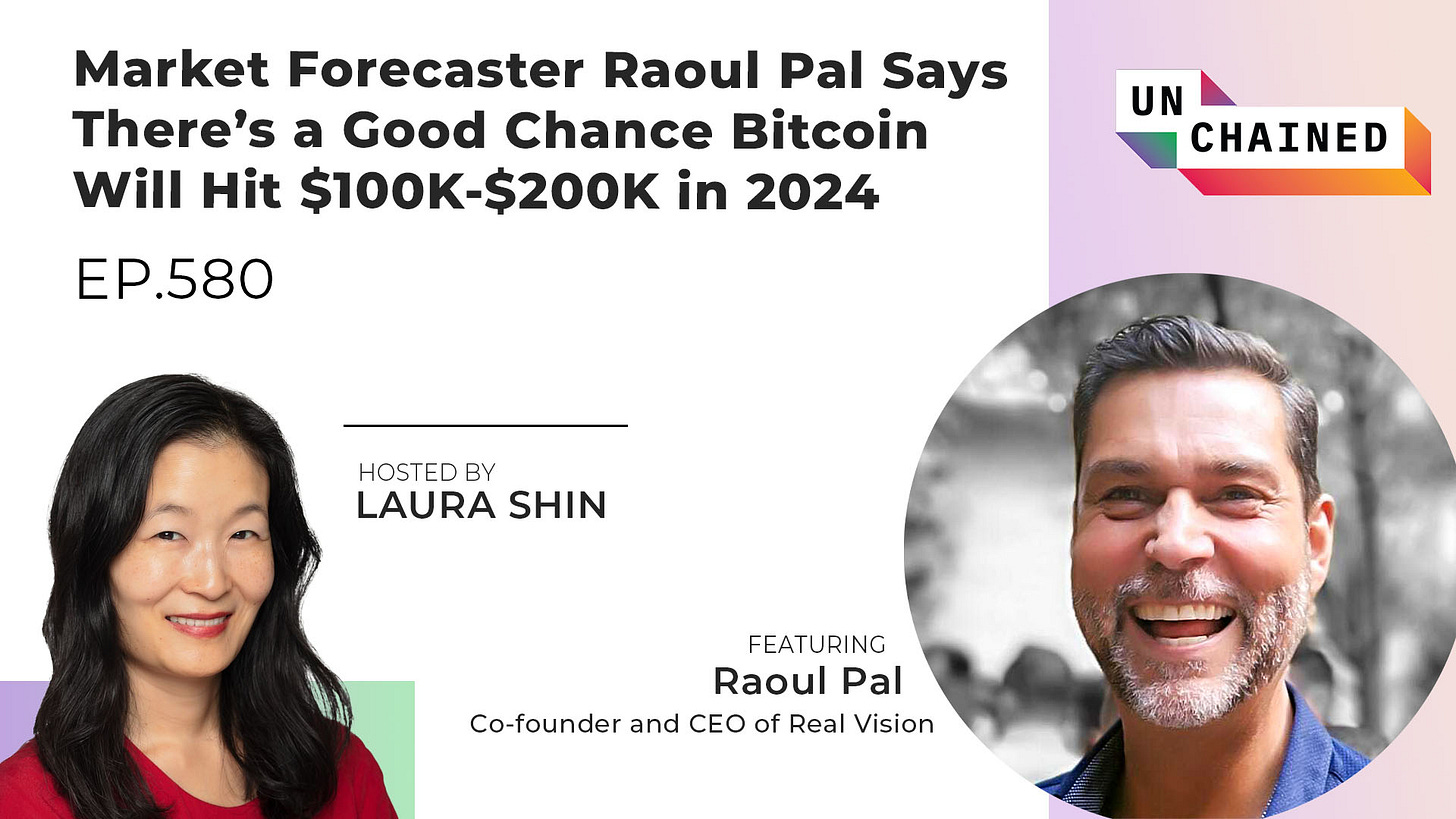Why Raoul Pal Is So Bullish on BTC, ETH and SOL
Weekly News Recap: 🚨 CZ's guilty plea, 🌏 Montenegro to extradite Do Kwon to U.S., 🛠️ Bitcoin Core v26.0 launch, 📉 Platypus exploiters walk free, and more!
You are reading the Unchained Weekly newsletter, where we cover all the major news in the crypto space, providing insights into the market's latest trends, regulatory shifts, and technological advancements. Stay informed. Your no-hype resource.
In this episode of Unchained, Raoul Pal, the founder and CEO of Real Vision, delves into the future of the crypto markets, especially focusing on Bitcoin's potential.
With an optimistic forecast, Pal believes in a strong upturn, stating, "I think if the space continues like this and we start getting monetary easing and the other conditions that tend to jumpstart the business cycle again, then we should see a very strong 2024 and most likely a strong 2025."
Pal also offers his take on the Ethereum vs. Solana debate and sheds light on the role of BRC-20 tokens: a positive development, according to him.
Listen to the episode on Apple Podcasts, Spotify, Overcast, Podcast Addict, Pocket Casts, Pandora, Castbox, Google Podcasts, Amazon Music, or on your favorite podcast platform. Or Watch it on YouTube.
Take Our Annual Survey 🙏
📢 Calling all Unchained fans! Take the Unchained annual survey and share your thoughts on how we can improve. 🚀
Participate for a chance to win exclusive Unchained merch! 🎁
Weekly News Recap
US Court Accepts Binance CEO CZ's Guilty Plea
A U.S. District Judge in Seattle accepted the guilty plea of Changpeng Zhao, the founding and former CEO of Binance. Zhao pled guilty to one count of Bank Secrecy Act violations. This decision by Judge Richard Jones comes amid allegations that under Zhao's direction, Binance failed to comply with sanctions and broke money transmitting laws. Zhao, who has paid $50 million personally and arranged for Binance to pay a $4.3 billion fine, faces restrictions on leaving the U.S. until his sentencing in February. Meanwhile, Binance's new CEO, Richard Teng, has stirred controversy by evading questions about the company's global headquarters and audit practices, though he later confirmed audits in regulated locations and told the Financial Times the European headquarters are in France and the Middle East headquarters are in Dubai.
Montenegro to Extradite Do Kwon to U.S.
On Thursday morning, the Wall Street Journal reported that Montenegro's Justice Minister, Andrej Milovic, signaled intentions to extradite Do Kwon, founder of the failed TerraLuna ecosystem, to the United States instead of South Korea. This follows a Montenegro court approving his extradition, connected to the $40 billion collapse of the TerraUSD and Luna cryptocurrencies. Kwon was arrested in Montenegro with a forged passport and denied the fraud allegations.The U.S. has leveled eight counts of fraud against him.
Simultaneously, Terraform Labs, the company behind the cryptocurrencies, is embroiled in extensive legal issues. In New York, the company has requested a jury to determine the regulatory status of its UST and LUNA tokens, amidst SEC scrutiny for alleged unregistered crypto asset securities. Additionally, in Singapore, Terraform Labs and Kwon suffered a legal setback when the High Court refused to dismiss a class-action lawsuit filed against them. The lawsuit, representing 375 claimants who allege a combined loss of $57 million, accuses Terraform Labs of fraudulent misrepresentation in promoting UST.
Bitcoin's Ordinal Surge Leads to Record Mempool Congestion
In a notable week for Bitcoin, the Ordinals Coin (ORDI) surpassed $1 billion in market value, a first for a Bitcoin Ordinal-linked memecoin. ORDI's price has soared 1,800% since early August, significantly boosted by its listing on Binance and other exchanges. This surge coincides with the broader market's uptrend, including Bitcoin's rise over $44,000. That’s a 158% increase over the past year. Analyst Christopher MacPherson from Arca highlighted ORDI's position as the largest BRC-20 token in the Ordinals ecosystem, benefiting from the potential Bitcoin ETF and renewed interest in building on Bitcoin.

Simultaneously, the Bitcoin network experienced record levels of congestion, largely attributed to a surge in BRC-20 transactions. The mempool, where unconfirmed transactions await network validation, exceeded its usual size, reaching around 1.57 GB, according to data site mempool.space. This congestion, linked to the popularity of Bitcoin Ordinals inscriptions, has sparked debate among Bitcoin developers. Luke Dashjr, a Bitcoin core developer, criticized these inscriptions for exploiting what he characterized as vulnerabilities in the Bitcoin Core software, potentially disrupting the network's efficiency and security. Dashjr's concerns reflect the growing pains of the evolving Bitcoin ecosystem as it adapts to new technologies such as NFT-like inscriptions. Of course, others think the ability to build on bitcoin in this fashion is a feature, not a bug. It’ll be interesting to see if Core clamps down on the ability.
Speaking of which, the latest Bitcoin Core update, v26.0, is now live, featuring a new v2 protocol for improved security against eclipse attacks that let malicious parties manipulate a node to behave in a way that in would otherwise, and encrypted connections between nodes. The update also speeds up the process of bringing nodes online with a Unspent Transaction Output (UTXO) snapshot, significantly reducing the time needed compared to the traditional full sync method.
Ethical Hacker Debate Ignites as Platypus Exploiters Walk Free
In a controversial decision, a French court has reportedly acquitted two brothers, known as Mohammed M. and Benamar M., who were responsible for a illicitly withdrawing $8.5 million from the decentralized finance (DeFi) protocol Platypus. Using a flash loan attack, the brothers exploited a code error, withdrawing funds through an uncollateralized loan and causing Platypus to suspend trading. Some consider this theft. Despite their admission to taking the assets in court, the brothers defended their actions as those of "ethical hackers," intending to return the stolen funds for a 10% fee, akin to a bug bounty. This argument swayed the court to dismiss all criminal charges against them. Furthermore, Platypus suffered another significant setback with a $2.2 million loss in a subsequent flash loan exploit, although 90% of these funds were later recovered.
On this week’s episode of The Chopping Block, white hat hacker Samczsun criticized the “code is law” mantra, which some argued in defense of the hackers' actions. He labeled it as “bullshit,” challenging the notion that such a principle should still be relevant or accepted in today's crypto community. Samczsun's comments highlight the ongoing debate about the ethics and legality of actions in the decentralized finance space, particularly in light of such high-profile exploits.
SEC Under Scrutiny: Missteps in Debt Box Case Raise Legal Questions
Debt Box and its associates, embroiled in a lawsuit with the U.S. Securities and Exchange Commission (SEC), have requested dismissal of the case. This development follows a court determination that the SEC misrepresented facts to secure a temporary restraining order, freezing Debt Box's assets over allegations of a $50 million fraudulent crypto scheme. The Utah federal court's reversal of the asset freeze, noting inaccuracies in the SEC's claims, has led to a “show cause order” against the SEC.
Meanwhile, on the regulatory front, JPMorgan CEO Jamie Dimon told Senator Elizabeth Warren that the government should shut down crypto, citing anti-money laundering concerns. "The only true use case for it is criminals, drug traffickers, money laundering, tax avoidance," he claimed. CoinTelegraph was quick to point out a recent report claiming that JPMorgan has been fined $38 billion under Jaime Dimon’s watch.
Crypto Champion Bids Farewell: McHenry's Departure Marks Shift in Congress
Continuing with the regulatory news, Representative Patrick McHenry (R-N.C.), a prominent advocate for crypto in Congress, announced that he will not seek re-election in 2024. McHenry, who chaired the Financial Services Committee, has been instrumental in advancing crypto-related legislation, including the notable Financial Innovation and Technology for the 21st Century Act, or FIT Act, which seeks to establish comprehensive rules for the crypto market. His departure represents a notable loss for the industry, as he was a key ally and a major recipient of campaign donations from crypto players. McHenry's decision follows a trend of crypto-friendly legislators leaving Congress, including Pat Toomey and Debbie Stabenow, further impacting the industry's representation in legislative matters. His departure raises questions about the future of his signature crypto legislation and the leadership succession within the Financial Services Committee.
NFT Market Revival: Ethereum Trading Hits Six-Month High
The non-fungible token (NFT) market on the Ethereum blockchain is witnessing a significant resurgence, reaching the highest trading activity seen in the last six months. The total trading volume of NFTs exceeded 105,000 ETH in the week ending December 4, marking a sharp 250% increase since early October. This revival follows a two-year low, possibly indicating renewed market confidence. Notably, the vintage NFT collection, CryptoPunks, saw a 45% increase in its floor price, reaching 57.24 ETH. Will Sheehan, CEO of blockchain analytics firm Parsec, likened this rally to a Bitcoin surge for the NFT market. The trading surge coincides with Ethereum's price rise to about $2,200, further fueling the NFT market's positive momentum. Notably, the majority of NFT trades are happening on Blur, a platform designed for high-frequency traders. In other words, these people aren’t actually holding the assets, they’re just moving them around really quickly and hoping to make some money. OpenSea ranks second.

Dogecoin Celebrates a Decade
Dogecoin, known for its satirical inception, making fun of cryptocurrency, celebrated its tenth anniversary on Wednesday. Initially created as a joke, Dogecoin has grown into a significant digital currency with a current market capitalization exceeding $14 billion. Billy Markus, the co-creator, humorously reflected on its unexpected success, noting the currency's surprising valuation. Over the years, Dogecoin has seen both charitable uses, like supporting the Jamaican bobsled team, and endorsements from high-profile individuals like Elon Musk, boosting its value and popularity. Despite a decline from its peak value, Dogecoin maintains substantial liquidity, trading for $0.094 with a recent increase in open interest.

Coinbase Adds Crypto Transfers via Social Media Links
Coinbase Wallet introduced a feature allowing users to transfer cryptocurrency via links shared on social media platforms like WhatsApp, Telegram, Facebook, TikTok, and Instagram. This functionality aims to make sending crypto as straightforward as texting. When recipients click on the shared link, they're directed to the Coinbase Wallet app to claim the funds. Additionally, if the transferred funds remain unclaimed for two weeks, they are automatically returned to the sender. Notably, transfers made in the USDC stablecoin are exempt from payment fees.
Blast's Rapid Growth
In a remarkable display of investor confidence—or desperation for new investment opportunities—Ethereum layer-2 Blast, still in development, attracted $700 million in locked assets. That’s despite the fact that it doesn’t even have an operational testnet. This surge in total value locked (TVL) places Blast alongside more mature layer-1 blockchains like Avalanche and Solana in terms of locked value. Blast's appeal stems from it's all-too-familiar sounding promise to provide yields and airdrops to depositors. The platform aims to leverage deposits for yield generation through staking and other asset protocols, with supposedly automatic returns to users. With backing from Paradigm and other notable crypto investors, Blast's rapid accumulation of funds could reflect a growing appetite for risk among crypto investors anticipating a mid-term bull run—or short memories of similar get-rich-quick offers that didn’t pan out. Caveat emptor.









